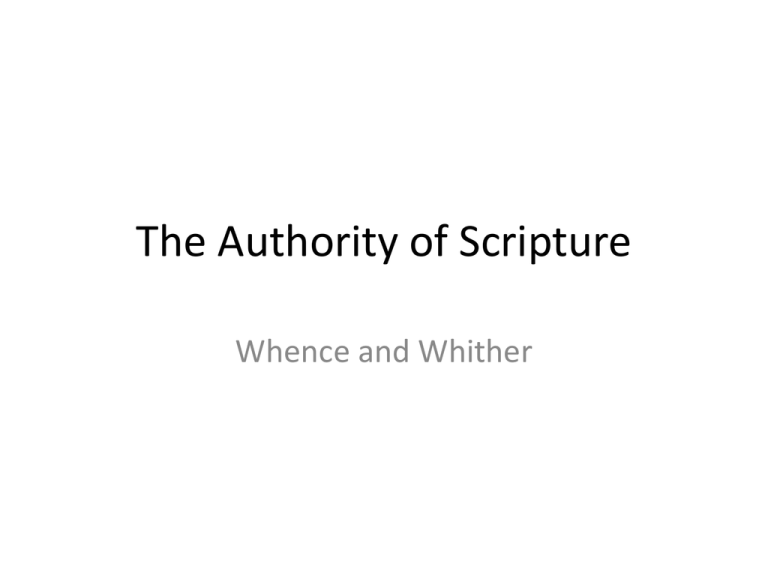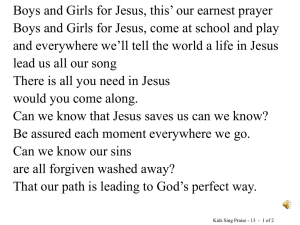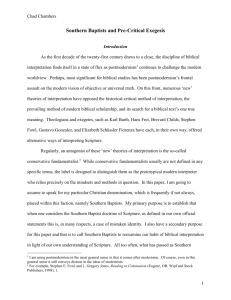The Authority of Scripture
advertisement

The Authority of Scripture Whence and Whither The purposes of Scripture • • • • Doctrine Proclamation Edification Instruction in righteousness (ethics and church practice) The Purposes of Scripture: Doctrine • Doctrine is a combination of Scripture and tradition – Messiah – Trinity – Divine and human natures of Jesus • Doctrine has not been particularly a bone of contention in the ELCA, except for • The Doctrine of Scripture itself – The humanity of the Scriptural authors – The role of interpretation The purposes of Scripture: Proclamation • Law and Gospel – Useful for reproof and correction – Norm for what we call good news • The insufficiently explored diversity of Scripture – Divergent responses to Israel’s exile – The four Gospels Responses to Israel’s Exile • Exile is God’s judgment. Joshua-2 Kings. – Exile could not be averted by military alliances or fighting to the last person. – Exile is not the result of God’s weakness – Exile is the result of a centuries-long pursuit of “other gods.” We know that idolatry that fears, loves, and trusts in something, or someone, other than God Responses to Israel’s exile Isaiah 40-55 • You have already received twice as much punishment as your sins deserved • Forget about the former things; Yahweh is about to do something brand new • Creation is not just a thing of the past, but a guarantee of God’s present power and a blueprint for what he would do with barren deserts and physically disabled people in a new era • A time for new obedience. And don’t be surprised if the shape of new obedience is suffering. Responses to Israel’s Exile • A time for maintaining identity—Sabbath and circumcision—articulus stantis et cadentis ecclesiae • Banking on the old promises—The everlasting promises after the flood and to Sarah and Abraham—so that they could move into the future • Practicing the presence of God around tabernacle/temple and the sacrificial system The Diversity of the Gospels: Mark • Jesus did not die [in Mark’s Gospel] so that sins might be forgiven; rather the courage of Jesus to live for others in the face of execution liberates others from the grip of selfpreservation in order that they too might live for others, thereby creating humane communities of mutual service. The diversity of the gospels: Luke • Out of compassion for those who suffer, God has sent Jesus to champion the poor, heal the sick, and accept the outcasts. 19:10 • The immoral way for a nation is to have great inequities in the society—an unequal distribution of wealth, a lack of justice, power in the hands of a small group who benefit themselves, and a great gulf between the haves and the have-nots. The diversity of the Gospels--Luke • In the Magnificat, the prophecy about what God will do through Jesus is stated in the past tense, as if the results were as good as done. By sending Jesus, God has brought down the powerful from their thrones and lifted up the lowly. God has filled the hungry with good things and sent the rich away empty. The diversity of the Gospels--Luke • In Luke, forgiveness is not connected to the death of Jesus. Jesus does not die for the forgiveness of sins or as a ransom for others. Jesus’ rejection and death are the consequence of his prophetic ministry against oppressors and on behalf of the oppressed. Repentance and forgiveness are major themes of Jesus’ whole ministry apart from any connection with his death. The purposes of Scripture: Edification • We are unanimous in affirming Bible study as a good thing • We are unanimous in admitting that we Lutherans are not doing a very good job of this • Hence – The Bible Book of Faith Initiative – Pastoral and congregational efforts to increase personal and corporate study of Scripture The purposes of Scripture: Instruction in righteousness • • • • Matthew 25 God’s preferential option for the poor Humans as created in the image of God Identification of “big sins” in our sermons or ministry – – – – – Racism, sexism Waste of natural resources and pollution of the environment Violence and militarism Neglect of the poor; poverty, and hunger/starvation The fractures in interpersonal relationships (marriage, congregational life, society and politics) – Not loving God (all sins are finally sins against the first commandment) – Not loving the neighbor (most sins against God are also sins against the neighbor) Division about Scriptural instruction in righteousness in the ELCA • Sexuality and in particular homosexuality 1. What does Scripture say? 2. How normative are those words today? 3. How church divisive are different answers to the first two questions? • Implications of the Bible and the gospel for our ecumenical actions 1. Do compromises to effect ecumenical changes (e.g. on apostolic succession) contradict the authority of Scripture or the Lutheran Confessions? 2. How church divisive are different answers to this question? Scriptural authority: Whence? • God’s word in human words • Basis of Scripture’s authority: Its central, saving message Scriptural authority: Whither? • The present and the future • Crisis and/or opportunity? – – – – – Secularization of society Biblical illiteracy Biblical fundamentalism Examples in the Bible of adaptability and change Consistent themes—grace (need for and abundance of), faith, responsibility, community – How we speak authoritatively about the Christian gospel to those who have never heard it—or who have misheard it?










